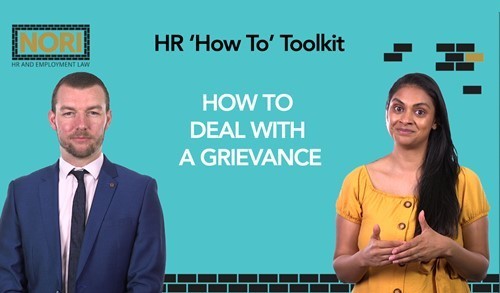Many workplaces are suddenly going to see an influx of existing staff and new staff returning to the workplace. In some cases, they will be returning full time, in others on a new working rota, following business working practices and changes adapted through lockdown.
Whether that be new recruits, return from Furlough, or business restructuring, it is inevitable this will also lead to a rise in grievances.
In this article we look at 'What is an Employee Grievance?' and how employers should deal with matters arising.
Simply put, an employee grievance is an issue, problem or complaint that an employee may have in the workplace. These can fall into some of the following categories:
Poor work to life balance Changes to roles / duties Lack of progression Pay concerns Too high of a workload Disputes with colleagues or managers Lack of, or poor-quality office policies Illegal or unlawful action taken or ing place Lack of concern over employee wellbeing – either health and safety or mental health Office politics that show favouritism and/or nepotism Lack of consistent treatment of staff e.g. different disciplinary outcomes for the same thingEvery organisation will come across their fair share of grievances.
They can be as little as a grumble from an employee that can be addressed quickly and effectively through informal means, to a full-blown employee grievance that requires formal action and specialist advice and support.
The ACAS Code of Practice does set out a fair procedure that should be followed when dealing with an employee grievance to ensure it is dealt with in a fair and reasonable manner.
In this article, we will look at:
How to deal with an employee grievance as a business Can the employee grievance be dealt with informally? How to deal with a grievance formally How to hold a formal employee grievance hearing Carry out an investigation into all the matters raised Delivering the outcome Can the employee appeal the decision? How are grievances typically resolved? Could mediation help? What happens if an employee raises a grievance during a disciplinary process?How to deal with an employee grievance as a business
Businesses don’t feel that grievances are going to impact them. They have a great team around them, and everyone is happy.
The reality is that everyone is human, and at one stage or another, there will be issues that need to be addressed. As a business, the best step you can take is ensuring you have a system or process in place that is very clear to understand and recognises when grievances are raised.
This shout include when an employee grievance is raised to their line manager in the first instance, which should be dealt with and addressed. Or, if the grievance is about the line manager, who the employee can turn to to register their grievance.
Having a clear procedure in place shows staff you have considered every eventuality. It also provides clear guidance on how they can address their concerns and that the business will take them seriously. The worst thing that can happen, is an employee has a concern and feels like they have nowhere to go or a person to turn to. This will just enable the problem to fester and become toxic in the workplace.
Can an employee grievance be dealt with informally?
As an employer, it is perfectly acceptable to see if a problem can be dealt with informally, with an open and frank conversation. Not everything requires a full-blown formal process. If the matter/s can be dealt with informally, with measures put in place moving forward so that similar issues don’t arise, everyone wins!
The worst thing an employer can do is to ignore an issue. Not only is this bad for staff morale, if the employee has more than 2 years’ service, it could also give rise to complains at an Employment Tribunal should the employee feel the situation has reached the point where they have to resign and claim constructive unfair dismissal.
How to deal with an employee grievance formally
Should an issue go beyond being able to be dealt with informally, the next course of action for the employer, is to deal with the matter through a formal grievance procedure. The process for this should be laid out in your Employee Handbook.
When it reaches this stage, you should ask the employee to put their grievance in written form. The employee should be specific explaining what they are aggrieved about. For example they should explain what has happened (incidents), when they happened, and if there any witnesses to the events that you can draw upon when looking at the matter.
Holding a formal employee grievance hearing
The best way to arrange a grievance meeting is to invite the employee to a formal meeting with the right to be accompanied by a colleague or a Trade Union. This is outlined in Section 10 of the Employment Relations Act 1999.
At the grievance hearing, the manager conducting the meeting should try to get as much information as possible. For example, what has happened to cause an employee to feel so strongly as to raise a formal grievance? They should get as much information from the meeting as possible in order to take away and investigate the matter outside of this meeting.
As with all formal meetings, minutes should be taken verbatim if possible. All parties shoud read, sign and date the minutes at the end of the meeting, as a true account of what was discussed. Should any party wish to record the meeting, they will need consent of all present in line with GDPR Regulations.
Carry out an investigation into all the matters that have been raised
As the employee has felt the need to raise a formal grievance, it is safe to assume there will be elements that require investigation and looked at closely. This will require the individual leading the grievance procedure, to follow due diligence and look closely at everything that has been mentioned. If the grievance is against another member of management, then discretion may be required to carry out a fair investigation that does not undermine their position within the business.
Delivering the outcome
As with any process, it is advised to give the outcome on a two pronged approach.
Verbally, either in person or by telephone. In writing, either via email or post.The outcome letter should outline all the concerns that were addressed in the meeting, what investigation steps have been taken by the manager to address the grievance, any evidence that was gathered during the grievance if it is appropriate to disclose it, and a formal outcome to each of the points. The employee should be given the right to appeal in this letter, with the appeal process mirroring the detail in the company employee handbook.
Can the employee appeal the decision?
The employee may not agree with some or all the findings, especially if the outcome didn’t go the way they were expecting. This can lead to the employee deciding they wish to appeal the findings.
There are 2 ways in which an appeal can be carried out by the company.
Table-top review of all the evidence and the appeal points that the employee has put forward. A full rehearing to go through all the evidence again and to consider the points the employee may have put forward in their appeal letter.It is advisable at this stage to appoint a new manager to deal with the appeal. This ensures the employee sees they are getting a fair process and that there is no argument of bias or that the manager was not impartial. The new manager carrying out the appeal would then potentially follow the same process as the previous manager if undertaking a rehearing.
Once the appeal has been concluded and the outcome given, (in the same fashion as the original decision), this is the end of the internal company processes for the employee. They either have to accept the findings, or potentially speak to ACAS to raise a claim.
How is an employee grievance typically resolved?
There is no clear answer to this question. Many grievances are dealt with informally without the manager / owner even realising it could have been a grievance in the first place.
For grievances that result in a more formal process, there are a multitude of options to the company to resolve this matter. If it is between 2 colleagues, could mediation work? Could you separate them and place them on different teams? Do you need to look at the internal procedures of the business that has given rise to the grievance?
The best thing a company can do is learn from the grievance. Whilst it does happen, it is few and far between that an employee raises a grievance just to be vexatious. Something generally has happened to trigger them to raise this concern.
Could mediation help?
If all parties named in the grievance are open to the idea, the best way to air issues within the workplace is to have a mediation meeting. This is generally a frank and open conversation where both parties can air how they are feeling and what their concerns are, with the meeting being overseen by a 3rd party. This ensures it stays on course and remains professional.
Dealing with grievances both informally and through mediation resolves the highest number of issues. It puts issues to bed before they can take root and cause potentially serious issues for the business in the long run.
What happens if an employee raises a grievance during a disciplinary process?
In some circumstances, it may be appropriate to suspend / delay the disciplinary process whilst the company deals with the grievance. This may not always be required, and it is all dependant on what has been raised within the grievance.
If there is an intrinsic link between the 2, the best course of action would be to deal with the grievance, before recommencing where you left off with the disciplinary.
If on the other hand, the disciplinary is around persistent lateness, but the grievance is about the workload the employee expected to undertake, there doesn’t appear to be an intrinsic link between the two, therefore both processes can run parallel to each other.
Visit our HR Toolkit page at https://norihr.co.uk/resources/employee-grievance/





















